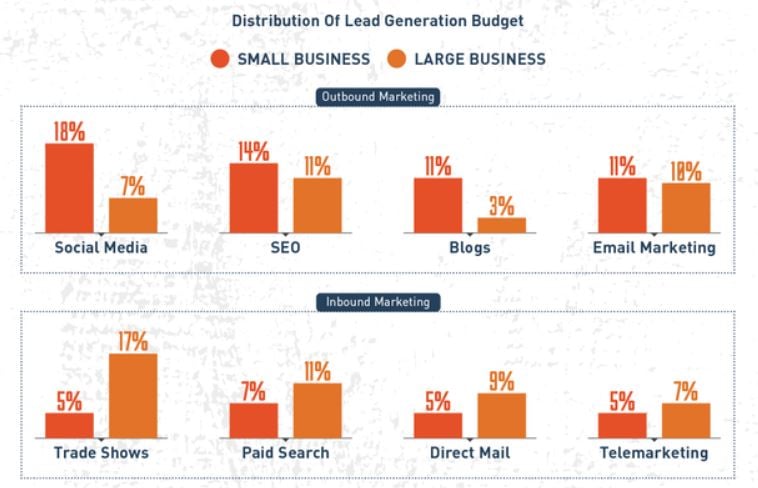
Lead Generation Services: 3 Things to Know Before Signing a Contract
Consideration #1: Lead Quality
How does the service in question generate their leads?
If I had a dollar for every email I received from some foreign company promising me thousands of qualified leads at a rock-bottom price, I would be wealthy.
Somehow, they are getting the contact information for people they say are qualified and interested in your service.
How are they getting that information?
Some companies buy leads in bulk, aggregated from all kinds of sources, and then resell those leads to businesses like yours. Others drive aggressive telemarketing campaigns. And others generate leads from legitimate authority websites, where they attract quality leads but don’t provide the services those leads are looking for.
The way a lead is acquired has a huge influence on their likelihood of converting - buying your product.
According to eConsultancy, outbound leads close at a rate of 2%, while organic search leads convert at 15%.
That's a 650% difference.
An IronPaper study found similar results.
"When asked which marketing tactic provides higher quality leads for the sales team, 59% of marketers responded inbound, and 16% reported outbound."
Figuring out how the leads were generated, and where they came from, is an important consideration before you purchase leads from a service. And, if you can’t get any real answers, run for the hills and don’t look back.
Consideration #2: Brand Affinity
Annoying 99% of your potential customers on the potential of selling 1% is not a good, long-term strategy. The brand landfill is crowded with the companies who wanted the quick sell that they alienated their best buyer personas by just being plain annoying.
If your lead generation service provider uses nefarious tactics to generate leads, think about the possible negative brand impact.
A recent study found that the FTC fielded 18,000 telemarketing complaints per month.
After all, who doesn't appreciate a phone call at dinner from a brand you're unfamiliar with, forcing you to speak to someone you can’t understand, and who won't take no for an answer?

Calculating the ROI of lead generation services isn't as simple as estimating lifetime customer value and subtracting payments to a lead generation company. If the provider annoys enough people, your brand will suffer.
Consideration #3: Business Size
You may have heard good things about a lead generation provider. Take a minute to consider who made that recommendation. Was it a big business, or a small one?
Larger businesses invest more in outbound channels than smaller businesses. They can afford to deploy massive resources, and even lose on ROI for a while. But smaller businesses need to get more from their limited budgets, and their pockets aren’t near as deep. 
Source: eConsultancy
If you are considering buying leads, first consider if it’s the best investment you can make with your marketing budget. Yes, it will get you a load of leads faster. But, will those leads pan out compared to investing in a marketing and lead generation engine for your own website?
Consideration #4: Close Rate
Some non-marketing executives may actually get excited about the thought of instant access to hundreds, or thousands of leads. They can start salivating just imagining the amount of revenue that will come from that windfall.
It’s important to also consider the close rate of those leads.
Everything in marketing is a numbers game. The bottom line is, how much return are you getting back for your investment. What is the cost of customer acquisition (CPA)? If your CPA is too high, you might be shocked to find out you’re spending more on leads than you’re generating in revenue.
Don’t laugh. I’ve known many larger, well-managed companies who thought their ad spend was bringing them business. But, when audited, they found out they were actually getting a negative ROI on their ad spend. They didn’t realize because other areas of customer acquisition were picking up the slack.
Measuring is always critical in long-term success.
Consideration #5: SPAM Complaints
Having contact information is different than having permission to use that contact information.
Using contact information without permission has a name: SPAM.
Not only is SPAM super annoying, but it’s also against the terms of service of almost every email provider. Not to mention, most of it is illegal.
Think of the nightmare scenario where you purchase leads expecting a windfall of customers, only to end up closing down your business because of it. Last year, Cynosure was penalized for $16 Million for spam faxes.
People still fax?
Yes! And, people still spam; even after lawsuits like that.
Are Your Gut And Head In Agreement?
There are times when you have to decide between what sounds good, and what is logical.
There are legitimate lead generation services out there. Some, work on your own website, and do advertising and outbound marketing to drive interest to that website. That’s the best-case scenario most of the time.
Still, there are tons of companies lined up to “buy” leads. Some will get good leads, and make a profit. Most will get a bunch of junk contacts and spam the life out of them.
The final consideration should be: is the money spent on buying leads better allocated to building our own lead generation machine? If you want our advice, the answer is always yes.
Buy leads for $5 today, and the benefit of those leads is gone. If you need more leads tomorrow, that price may be $6. The next time, maybe that price is $20. No matter which way you slice it, lead generation pricing isn't cheap and the fruits of your payments evaporate instantly.
The point is, the price goes up, and the benefit never carries beyond the last purchase. When you decide that it’s too expensive to turn an ROI, you have no options. But, for the companies that invest in their own ability to generate leads, are not just spending money into an ever-increasing priced vending machine. They are building an infrastructure that continues to build leads, compounding over time.
Dollar-for-dollar, investing in your own infrastructure will pay much higher ROI over the long term. It’s not the quick win of ordering the pallet truck of leads. But, it’s the long-term play that will win in the end.



